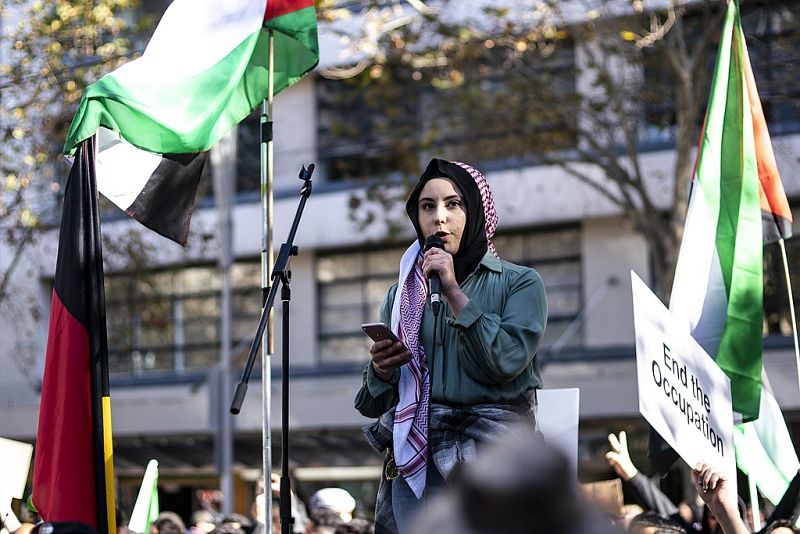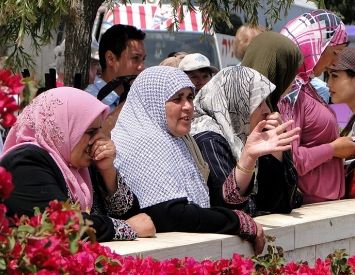When Israel unleashed its latest use of force against the Palestinian people, trapped within the confines of the Gaza strip in May, a combatant entered the field that shook Israel — the working class.
A Palestinian general strike, supported by the Palestinian trade unions, was observed across the Occupied Territory and Israel. Palestinian workers organisations called out to trade unions around the world to refuse to handle Israeli goods. Workers in Genoa, Italy, Durban in South Africa and Oakland in the U.S. answered the call.
All of them took industrial actions against ZIM’s ships, the Israeli state-owned shipping company and the 10th largest carrier in the world.
Protests against ZIM are spreading to other cities in the U.S. including New York. Workers and the Palestinian solidarity movement in Australia have the opportunity to join this rising working-class movement against the Apartheid Israeli state, as ZIM’s ships profits handsomely from shipping freight to and from the Australian ports of Melbourne, Sydney and Brisbane.
On 22 May, the Palestinian General Federation of Trade Unions (PGFTU) and other Palestinian workers organisations put out a joint statement, saying:
'This week, Palestinian activists and trade unions held a General Strike across historic Palestine. This is the first strike in recent history to bring together Palestinians no matter where we are located. In order to achieve our liberation, however, we require the solidarity of our comrades and friends in the trade union movement internationally.'
Amongst other acts of solidarity, the statement asked that:
' ... in the spirit of internationalism and solidarity, we are calling on trade unions to encourage workers to refuse to handle Israeli goods and/or support members refusing to build Israeli weapons.'
Palestinian organisations, including the PGFTU, also issued an open letter on 14 May, stating:
'Palestinian trade unions are calling on our brothers and sisters in the trade union movement internationally to stop handling goods imported from or exported to Israel. The trade union movement has a proud history of direct action against apartheid in South Africa. Let’s build a new anti-apartheid movement to end Israel’s impunity.'
Taken together, these statements are an unequivocal demand for workers to use their industrial power to act collectively in defence of the Palestinian people This is exactly what we have seen occurring around the world with workers refusing to unload ZIM’s ships.
Solidarity from Livorno, Northern Italy
The first action to occur by workers in response to the recent onslaught on Gaza were dockworkers in the Port of Livorno in Northern Italy. The workers organised in Unione Sindacale di Base (USB), an independent trade union organisation representing workers in the main commercial port of Tuscany in Northern Italy.
They refused to load a ship that they believed might be carrying weapons destined for Israel. The USB workers issued a statement that they no longer intended to load weapons that were destined to kill civilians, in Gaza or elsewhere.
USB member Massimo Mazza told Arab News:
“We have no intention to facilitate the transportation of weapons and explosives that will be used to kill the Palestinian people, who are suffering so much and mourn hundreds of innocent civilian victims, including many children.”
Activism in Durban, South Africa: The challenges of solidarity
On 18 May, the South African Transport and Allied Workers Union (SATAWU), issued a statement in calling on dockworkers in Durban to refuse to offload a ZIM ship, in support of the Palestinian struggle. About 100 protestors protested the docking of the ZIM ship on 21 May.
Although the protestors initially believed that the ship had not been unloaded, the South African government-controlled Transnet Port ensured the ship was unloaded and loaded.
As Motingoe Lwandle and David Hemson have explained, a union bureaucracy issuing a statement is not the same as creating a real coalition of rank and file workers and solidarity campaigners on the ground.
“Block the boat” actions in New Jersey and Seattle
A "block the boat" action occurred at the Port of Oakland, New Jersey, on 5 June when hundreds of activists maintained a picket across six gates of the port to picket the unloading of a ZIM ship.
When the International Longshore and Warehouse Union (ILWU) Local 10 refused to cross the picket line, the ship was successfully turned around and unable to unload.
The President of the ILWU Local 10, Trent Willis, stated that the:
“Workers’ struggle is worldwide. Worker power, and economic power, is real power. It’s more powerful than those bombs Israel is dropping.”
This is not the first time that such action has been taken in Oakland. A similarly successful blockade of a ZIM ship occurred in 2014.
Elias Al-Jelda, an executive committee member of the PGFTU in Gaza, said that:
'It warms our hearts in the besieged occupied Gaza Strip and the rest of occupied Palestine that our comrades led by AROC, and with the solidarity of our fellow workers in ILWU Local 10, achieved this great victory against ZIM in Oakland.'
On 6 June, in a significant escalation of the "block the boats" protests in the U.S., the first such protest was held at the dock in New Jersey when a ZIM ship came to dock.
A ZIM ship has also been successfully blocked by pickets in Seattle on 12 June and actions are planned in other cities.
This movement is spreading through unions and activists creating genuine delays in several ZIM ships unloading and having to seek alternate ports on both the East and West coast that would be imposing a huge financial impost on the company.
Efforts are being made to spread the "block the boats" action into Canada, with a small protest occurring at the Prince Rupert Port against one of the redirected ZIM ships. However, it did not stop the boat from docking.
ZIM ships dock in Australian cities
ZIM runs freight between Chinese ports and Melbourne, Brisbane and Sydney, as their schedule attests.
In addition to joining the ongoing solidarity protests in the streets, Australian workers and solidarity activists have the opportunity to do something concrete to impact the financial interests of Israel to protest its apartheid policies.
Appeals must be made to the rank and file workers at the dock, represented by the Maritime Union of Australia, to join and respect these pickets, just as their brothers and sister dockworker in Italy and the U.S. have done.
Brilliant work has been carried out by many through building large rallies and organising the Palestinian solidarity movement in Australia. But creating a "block the boats" movement in Australia would be a powerful addition.
Davey Heller is a writer and campaigner. You can follow him on @socialist_davey.
Related Articles
 This work is licensed under a Creative Commons Attribution-NonCommercial-NoDerivs 3.0 Australia License
This work is licensed under a Creative Commons Attribution-NonCommercial-NoDerivs 3.0 Australia License
Support independent journalism Subscribe to IA.















